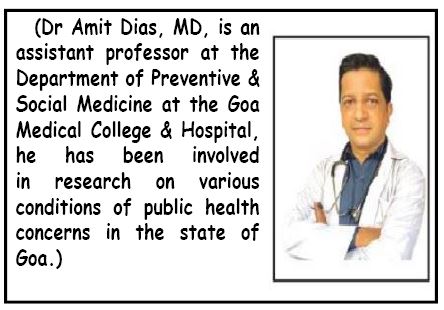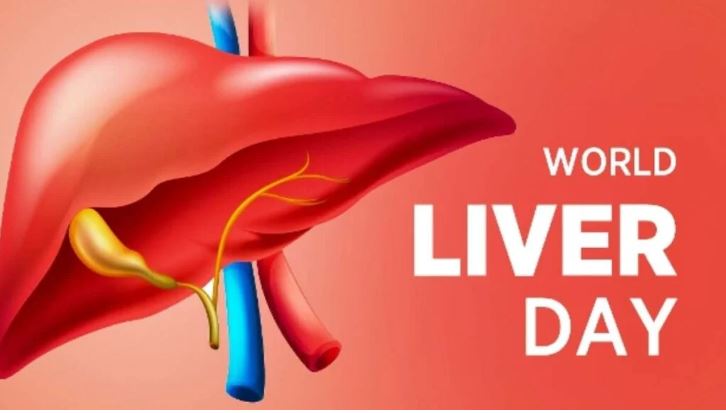A World Liver Day Special!
An interview with Dr Amit Dias
World Liver Day is observed on April 19 annually. Says Dr Amit Dias, “Love your liver, love your Life!” He highlights that besides alcohol there are other risk factors that harm the liver. We need to be aware of the rising epidemic of non-alcoholic fatty liver disease (NAFLD).”
An interview with Dr Amit Dias
Goan Observer: Could you tell us why World Liver Day is observed on April 19 each year?
Dr Amit Dias: World Liver Day is observed on April 19 to raise awareness about liver-related diseases and the importance of liver health. It serves as a reminder to people to take care of their liver and get regular check-ups. We often ignore our liver which plays a vital role in our body. Liver Day is a reminder to all of us to love our liver just as much we love our heart!
In a state like Goa it is vital to raise awareness and promote liver health — we have a high proportion of alcohol consumption, obesity and diabetes, and these are the major risk factors that damage the liver.
Q: That’s great to know. Could you please simplify and explain the role of the liver in our body?
A: The liver plays a vital role in our body’s metabolism. It’s an essential organ performing hundreds of functions. It helps in digestion, production of bile, blood filtering, detoxification of harmful substances, storage of nutrients like glycogen, vitamins and production of proteins necessary for blood clotting, among many other functions.
Q: What are some common diseases that affect the liver, and how can we prevent them?
A: Some common liver diseases include hepatitis, fatty liver disease, cirrhosis, and liver cancer. To prevent liver problems, it’s important to maintain a healthy lifestyle, avoid excessive alcohol consumption, eat a balanced diet, exercise regularly, and get vaccinated for hepatitis. We need to be aware of the new epidemic of non-alcoholic fatty liver disease (NAFLD), where in people who do not consume alcohol, present with alcohol-like damaged fatty liver which could progress to cirrhosis.
Q: Speaking of alcohol, what is the association between alcohol and liver disease, and what kind of damage does excessive alcohol consumption cause?
A: Excessive alcohol intake can lead to alcoholic liver disease, which includes fatty liver, alcoholic hepatitis, and cirrhosis. Chronic alcohol abuse damages liver cells, impairs liver function, and can ultimately result in irreversible liver damage.
Q: You mentioned a NAFLD epidemic. Who is most at risk of developing it? And is it a condition we can prevent?
A: NAFLD stands for non-alcoholic fatty liver disease, a condition where excess fat is stored in the liver. It is often linked to obesity, type-2 diabetes, and metabolic syndrome. To prevent NAFLD, it is essential to maintain a healthy weight, eat a balanced diet, exercise regularly and avoid sugary beverages.
NAFLDis a leading cause of liver disease worldwide. The estimated global incidence of NAFLD is 47 cases per 1,000 population and is higher among males than females. The estimated global prevalence of NAFLD among adults is 32% and is higher among males (40%) compared to females (26%).
Q: How can we protect our liver?
A: The good news is that what is good for the heart is also good for the liver. We need to change our lifestyle and be aware of the toxins in our food and environment. Protecting the liver from damage involves adopting healthy lifestyle habits and avoiding behavior or patronizing substances that can harm it. Here are some tips to help safeguard your liver health:
MAINTAIN A HEALTHY WEIGHT: Obesity can increase the risk of fatty liver disease and other liver conditions. Aim for a balanced diet and regular exercise to maintain a healthy weight.
LIMIT ALCOHOL CONSUMPTION: Excessive alcohol consumption can lead to liver inflammation, fatty liver disease, cirrhosis and other serious conditions. If you drink alcohol, do so in moderation, or consider abstaining altogether.
EAT A BALANCED DIET: Consume a diet rich in fruits, vegetables, whole grains and lean proteins. Limit saturated fats, refined sugars and processed foods. A healthy diet supports liver function and overall health.
STAY HYDRATED: Drinking an adequate amount of water helps the liver flush out toxins from the body. Aim to drink plenty of fluids throughout the day, primarily water.
AVOID RAISKY BEHAVIOUR: Infections can damage the liver and cause hepatitis. Practice safe sex to reduce the risk of hepatitis B and C infections which can cause liver damage. Also, avoid sharing needles or engaging in other high-risk activities. Hepatitis A and B can be prevented with a vaccine.
USE MEDICATIONS WISELY: Follow your healthcare provider’s instructions when taking medications, including over-the-counter drugs and supplements. Some medications can be harmful to the liver, especially when taken in large doses or for extended periods.
LIMIT EXPOSURE TO TOXINS: Minimize exposure to environmental toxins and chemicals, such as pesticides and household cleaning products, which can burden the liver. When using such substances, follow safety guidelines and use protective equipment if necessary.
EXERCISE REGULARLY: Regular physical activity can help reduce the risk of fatty liver disease and improve overall health. Aim for at least 30 minutes of moderate-intensity exercise most days of the week.
MANAGE CHRONIC CONDITIOINS: If you have diabetes, high blood pressure, or other chronic conditions, work with your healthcare provider to manage them effectively. These conditions can increase the risk of liver disease if left uncontrolled.
By incorporating these habits into your lifestyle, you can help protect your liver from damage and maintain optimal liver health. If you have concerns about your liver health or any symptoms of liver disease, consult with a healthcare professional for personalized advice and guidance.
Q: Lastly, what message you would like to share on World Liver Day?
A: The theme for World Liver Day 2024 is “Love Your Liver, Live Your Life.” The message focuses on promoting liver health through awareness, education, and early detection of liver diseases. It aims to inspire individuals to take charge of their liver health and adopt healthy habits for a better quality of life.
Even if the damage has started, you can reverse liver disease – it is never too early and never too late.

